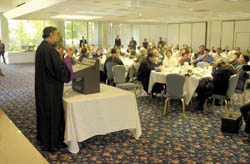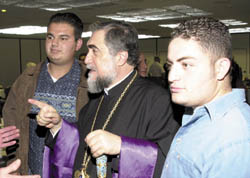By John Jabagchourian
Editor
 On a trip to the United States, is Holiness Aram I,Catholicos of the Great House of Cilicia, made a special stop at California State University, Fresno on the morning of October 23, 2000 to speak to students and faculty on “The Ecological Crisis, Its Causes and Implications: A Christian View.”
On a trip to the United States, is Holiness Aram I,Catholicos of the Great House of Cilicia, made a special stop at California State University, Fresno on the morning of October 23, 2000 to speak to students and faculty on “The Ecological Crisis, Its Causes and Implications: A Christian View.”
Dressed in the traditional black robe with purple cuffs, His Holiness Aram I arrived on campus with an entourage of bishops and local religious leaders of the Armenian Church at the invitation of and as guest of the Armenian Studies Program. He was greeted by Dr. John Welty, President of the University and a number of officials.
Dr. Dickran Kouymjian, Director of the Armenian Studies Program, introduced the Catholicos to the large crowd of students and guests who had gathered in the Satellite Student to hear the Catholicos speak.
“The ecological crisis is not an environmental problem . . . it is due to the relationship between humanity and creation, a relationship that is not based on ethical, moral, and spiritual values,” His Holiness Aram I said. “Unprecedented economic, technological and industrial progress with unlimited use of earth’s limited resources has greatly jeopardized the ecosystem that sustains our universe.”
His speech demonstrated a link between theology and the preservation of the environment. His Holiness stressed that the earth, its resources and all life are God’s creation; however, humanity has distorted this concept and has exploited God’s creation by misusing its limited resources for purposes of greed rather than satisfying the needs of survival. He made a reference to today’s misuse of natural resources as a repetition of the “Original Sin.”
“Humanity considers itself as the owner, the master, of creation,” the Catholicos said. “[Humanity] needs to move from being the owner to being a representative of God.” The speech included ideological changes that humanity as a whole needs to be make in order to achieve a sustainable future.
“Societies should establish the ways of life and initiate the processes in their lives that articulate clearly the sense of accountability to God . . . We cannot achieve a sustainable future for humanity in an ecological sustainable creation when we do not have an ethically sustainable society,” he said.
His Holiness urged the initiation of an economic-developmental policy that respects the limited resources of the earth and the need to move from an elite-centered economy to a participating economic system.” Catholicos Aram I also stated that people must become responsible consumers and that the transnational corporations and their emphasis on production are evil by playing a negative and destructive role.
“Any ecological, economic or social analysis or prescription will, fall short unless they are substantiated by an ethical perspective,” the Catholicos said. However, His Holiness said explicitly that he did not have the detailed solutions to solving the problem and that he was focusing on clearly describing the root causes of the ecological crisis to work from.
Simply stated, His Holiness said, “This is our house, we have to keep it clean.” After the speech, His Holiness along with Fresno State students and special guests went across campus to the Residence Dining Hall for a buffet luncheon.
 At the luncheon His Holiness spoke to a group of more than 100, mostly students, including nearly all fifty members of the Smittcamp Honors College. His topic was the World Council of Churches and his duties as Moderator of the Central and Executive Committees of the Council.
At the luncheon His Holiness spoke to a group of more than 100, mostly students, including nearly all fifty members of the Smittcamp Honors College. His topic was the World Council of Churches and his duties as Moderator of the Central and Executive Committees of the Council.
The World Council of Churches (WCC) is an international organization created in 1946 that is currently made up of 382 churches from different regions around the world. The WCC works to help individual churches deal with issues such as violence, church-society relationship, poverty, racism, human rights, as well as a host of other pressing issues. The WCC is headquartered in Geneva, Switzerland.
His Holiness Aram I was elected Moderator, the highest position of the World Council of Churches, in 1991 and reelected for an unprecedented second term in 1998. The entire body of the WCC meets once every seven to eight years while the Central Committee meets once a year and the Executive Committee meets twice a year.
At the end of the luncheon, students asked the Catholicos questions about the differences between the Roman Catholic church and other Christian churches, bioethics in relation to generating enough food for the world’s population, the relationship between religion and politics, and the big question, church unity.
His Holiness’ response to the question of unity in the Armenian church was, “We cannot speak about two Armenian churches, we are one church and within one family you may have some difficulties, sensitivities, but we all belong to one family.”
“We have one church and our church is united,” he said. The audience applauded in agreement with the Catholicos’ answer.
When asked by Dr. Kouymjian if he would come back to speak on campus again, His Holiness said, “I promise you when I come back to the United Sates, I will come and see you again.” In 1995, His Holiness Aram I was elected Catholicos of the Great House of Cilicia, located in Antelias, Lebanon.
The Catholicos studied at the Theological Seminary of the Cilician Catholicosate in Antelias then went on to the Near East School of Theology and the American University of Beirut as well as the Ecumenical Institute in Geneva. He then completed his Ph.D. in philosophy and systematic theology at Fordham University in New York.
His Holiness is the author of 20 books ranging in topic from medieval Armenian theology to the world ecumenical movement. The Catholicos’ visit to Fresno State was also a reunion of teacher and student. Dr. Kouymjian, Haig and Isabel Berberian Chair of Armenian Studies, was one of Aram I’s professors at the American University of Beirut, in Lebanon, in the 1970s.
His Holiness was in California to preside over the “Armenian Cilicia” conference at UCLA on October 20 and 21. The conference was part of the UCLA International Conference Series on Historic Armenian Cities and Provinces, organized by Dr. Richard Hovannisian and sponsored by the Armenian Educational Foundation Chair in Modern history at UCLA. He then traveled to Fresno to participate in the festivities surrounding the 100th anniversary of the founding of Holy Trinity Armenian Apostolic Church.
 Hye Sharzhoom Armenian Action
Hye Sharzhoom Armenian Action